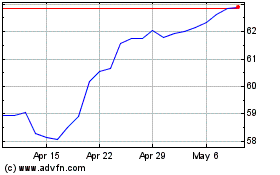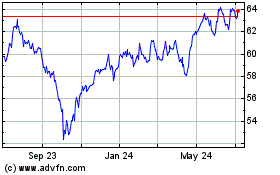Coke: Smaller Cans Pay Off -- WSJ
February 10 2017 - 3:03AM
Dow Jones News
Profit and revenue fall, but beverage maker plays up strategy
shift on packaging, pricing
By Jennifer Maloney and Anne Steele
Coca-Cola Co.'s profit fell by more than half in the final
quarter of the year, hurt by weakness in developing markets, but
the company pointed to signs in North America and elsewhere that
its shift to lower-calorie beverages and smaller, higher-priced
packages is working.
Coke has been divesting from its bottling operations to focus on
its more profitable concentrate business, a process it expects to
accelerate in 2017 to meet a self-imposed December deadline. That
contributed to the 56% decline in fourth-quarter net income, to
$550 million, compared with $1.24 billion a year earlier. The
company expects adjusted earnings per share to decline 1% to 4% in
2017.
In the U.S., Coke is shifting from a volume-based model to one
in which the company shares profit with its bottlers, selling
smaller cans and bottles at higher prices. Smaller packages in the
U.S. grew almost 10% in the quarter, said Chief Operating Officer
James Quincey, who will become CEO of the company in May.
North America offered a brighter picture of Coke's operations in
general: Higher pricing and smaller packages drove revenue growth
of 8%, even as volume grew just 1%. Global volumes fell 1% in the
quarter, dragged down by declines in Latin America.
Coke is reformulating its beverages and offering more
zero-calorie options as governments in the U.S. and elsewhere weigh
special taxes on sugary drinks to fight rising obesity and diabetes
rates.
Coca-Cola Zero Sugar, a new version launched last summer in the
U.K., saw double-digit volume growth in Western Europe, boosted by
expansion into France, Belgium, Netherlands and Ireland. The soda
tastes closer to original Coke, and its name is intended to better
communicate to consumers that it contains no sugar.
The company continued the global expansion of its premium
smartwater brand, which saw double-digit volume growth in North
America in 2016. Rival PepsiCo Inc. last month launched a competing
product called LIFEWTR.
Coke's revenue has declined in each of the past four years.
Despite a diversification push into juices, bottled waters and
other beverages, soda still represents about 70% of company
sales.
Mr. Quincey has said that he would like to go faster in
diversifying Coke's beverage portfolio. In a conference call with
analysts Thursday, he noted that the company has done a few bolt-on
acquisitions each year and "hopefully we will do a few in
2017."
On a call later in the day with reporters, Coke's current CEO,
Muhtar Kent, said that the border-adjustment tax proposed by
congressional Republicans wouldn't hurt the company.
"We produce locally...we sell locally and we pay taxes locally,"
he said. "So from our perspective, obviously, it's not going to
make a difference to our business."
But Mr. Kent expressed concern about President Donald Trump's
public statements. "This kind of rhetoric is also somewhat worrying
because it will have a negative impact on global trade," Mr. Kent
said.
Coke's soda volumes world-wide fell 2% in the quarter, while
noncarbonated drinks, which include tea, coffee and juice, grew
2%.
Revenue slipped 5.9% to $9.41 billion, but stayed above
analysts' prediction for $9.13 billion. The company said foreign
exchange shaved 2% off its revenue in the quarter.
PepsiCo is scheduled to report its results next week.
Write to Jennifer Maloney at jennifer.maloney@wsj.com and Anne
Steele at Anne.Steele@wsj.com
(END) Dow Jones Newswires
February 10, 2017 02:48 ET (07:48 GMT)
Copyright (c) 2017 Dow Jones & Company, Inc.
Coca Cola (NYSE:KO)
Historical Stock Chart
From Mar 2024 to Apr 2024

Coca Cola (NYSE:KO)
Historical Stock Chart
From Apr 2023 to Apr 2024
